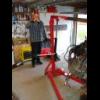Tis the rules young Harry, you leave the door open then there will always be somebody taking advantage. ![]()
![]()

Where Should Copper Grease Not Be Applied?
#16

Posted 30 January 2014 - 10:51 PM
#17

Posted 30 January 2014 - 11:01 PM
Are there any performance increases from Cooper grease?
Yes, if you put it on the brake disc and pad rubbing surfaces, you get to enter corners a lot faster.
(Just to be safe); This is a joke, do not do this to your car! ![]()
Edited by myredmini, 30 January 2014 - 11:06 PM.
#18

Posted 30 January 2014 - 11:02 PM
Applying some on the edges of the brake pads when replacing then helps prevert the friction between caliper and pad..
Coating none critical bolt/nut heads is a good idea to fight against corrosion, im guessing grease is better for that though.
A few doors down is a 91 year old lady who's son has an old fiesta garaged up that im told always got a fresh covering of grease all over the underside each year, thinking about it the front subby looked like new underneith all the oil and grease that had got on over the years with a layer coating of road much to harden it up abit, for me its the best solution after coating the surface with paint and stonechip
Cliff
EDIT: Sorry went abit off topic there haha
Edited by rally515, 30 January 2014 - 11:03 PM.
#19

Posted 31 January 2014 - 06:14 AM
I use it a lot in an attempt to make my life easier next time I come to do the job. It has a resilience to high temperature so there's no problem using it around the engine / exhaust (external use only of course)
#20

Posted 31 January 2014 - 10:09 AM
It's all good fun!
I use it a lot in an attempt to make my life easier next time I come to do the job. It has a resilience to high temperature so there's no problem using it around the engine / exhaust (external use only of course)
For high temperature use you are better off using a Nickel anti seize, never-seez on things like the manifold nuts etc. we use this all of the time on any high temperature component on Jet Engines from small nuts and bolts to boroscope plugs, igniter plugs etc.
Not cheap but it is extremely good.
I still use Copper-slip on brakes components and non high temp items.
#21

Posted 31 January 2014 - 12:27 PM
#22

Posted 31 January 2014 - 12:31 PM
Two places I would suggest never using copper grease are on things that need lubrication because they intentionally move quite a lot, such as door, bonnet and boot hinges and seat runners, clutch release arm, handbrake mechanism in rear drums, etc, where graphite grease or even plain old LM is better, and definitely not on brake pipe threads and bleed nipples, where the slightest ingress of mineral oil, a constituent of all greases, must be avoided.
Brake pads don't move significantly in use, only a few thou back and forward, and a slow creep forward as they wear, so no real lubrication as such is needed, and on the back of the pad some copper grease may often prevent brake squeal (no guarantee, if it happens it can be very hard to eliminate on some cars).
Just remember, copper grease is NOT A LUBRICANT, but is an ANTI-SIEZE COMPOUND and you will not go wrong.
Some people use it on the rear subframe to heelboard bolts, and there is nothing wrong with doing so, but I prefer taking a bolt out at a time and injecting lots and lots of Waxoyl, to protect not only the bolt threads but the important inner sill to heelboard stiffner bracket. Of course you will be injecting every orifice and drain in the sills too.
I once had an aerosol can of GEX, which was useful in some places under a typical car, such as handbrake mechanisms, where neither conventional grease nor copper grease was ideal. It is sticky stuff and tends to stay in place quite well. It is supposed to be for chains and gears, but worked very well on the handbrake and pedals on my old Rover P4, many years ago. It is black and filthy, somewhat like CV joint grease, so not for things which you may come in contact with like door hinges and seat runners.
https://www.chemsear...icants&pid=5187
#23

Posted 31 January 2014 - 05:37 PM
Some very interesting and useful replies there. I now have a much better idea on where anti-seize grease can be used. I think I'll get some of that never-seez for my engine build, obviously only for places that don't use thread lock.
I knew this thread would get some useful replies in the end ![]()
#24

Posted 31 January 2014 - 05:52 PM
1 user(s) are reading this topic
0 members, 1 guests, 0 anonymous users

















